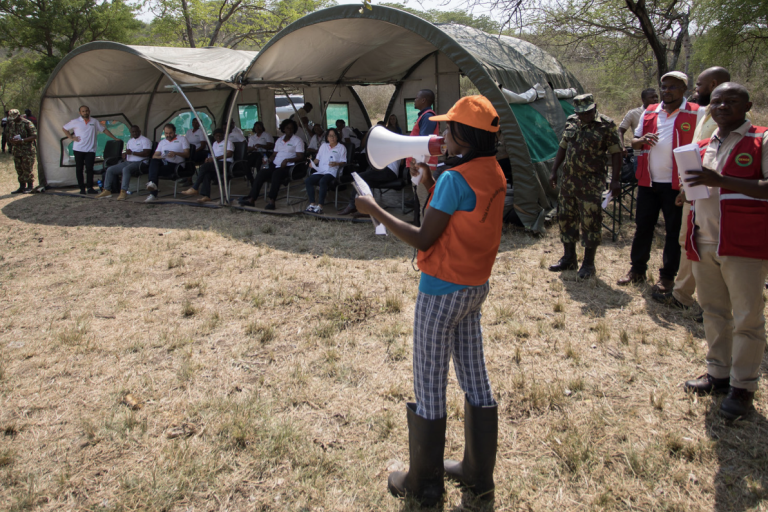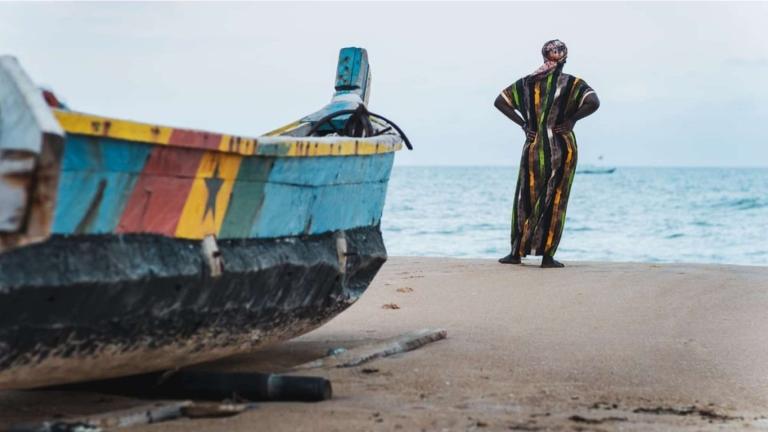Countries on frontline of climate change expand early warning protection but progress insufficient
Dubai (United Arab Emirates) – More lives are being protected from extreme weather and dangerous climate change impacts but there is a long way to go. Half of countries globally still do not have adequate multi-hazard early warning systems.
- Published in partnership with:
- United Nations office for Disaster Risk Reduction (UNDRR)

A new report from the United Nations Office for Disaster Risk Reduction (UNDRR) and the World Meteorological Organization (WMO) finds that Africa has doubled the quality of early warning systems coverage, but still falls below the global average. Less than half of the Least Developed Countries and only 40% of small island developing States have a multi-hazard early warning system. In the Arab States, risk knowledge to underpin early warning systems was found to be particularly low.
The report, the 2023 Global Status of Multi-Hazard Early Warning Systems, analyses the latest data one year into the Early Warnings for All Initiative which aims to cover everyone everywhere by 2027.
It was launched at COP28 by United Nations Secretary-General António Guterres at a high-level event attended by ministers and stakeholders. The report reveals that 101 countries have reported having an early warning system, an increase of six countries compared to last year, and representing a doubling of coverage since 2015.
“What we are delivering under the Early Warnings for All initiative can protect and save vulnerable communities from the worst impacts. This is an ambitious goal – but it is also achievable,” said António Guterres, Secretary-General of the United Nations
The Secretary-General called for a doubling of the speed and scale of support in countries in 2024. “For us to make it a reality we need all hands on deck rowing in the same direction – collaborating and cooperating in a way that we have not done before.”
New announcements made today at the high-level event included 60 million Swedish Krona (5.3 million Euros) from Sweden and 40 million Danish Krone (5.4 million Euros) from Denmark and confirmation of an additional 8 million Euros per year in funding from France.
The new funding will speed more rapid progress and build on the foundations already laid since the initiative was launched, including the joint commitment of all major Multilateral Development Banks and the Green Climate Fund in scaling up investment for early warning systems. The focus now is on scaling up support in more countries and securing the finance to deliver Early Warnings for All in the next four years.

Progress
Maldives, Laos and Ethiopia now have dedicated national action plans and coordination structures in place. Benin has strengthened communications to reach communities at greatest risk. Fiji’s flash flood warning has been strengthened to protect the entire population of nearly 1 million people, Mr Guterres said.
Over 400 million people in LDCs and SIDS now have access to better predictions and warnings for floods, drought, heat waves and tropical cyclones. Countries such as Papua New Guinea and Burkina Faso can now issue drought seasonal predictions for small-scale farmers, many of them women, thanks to the Climate Risk and Early Warning Systems Initiative (CREWS).
France announced that it would provide annually Euro 8 million to CREWS for the coming years, a doubling of their previous commitments. This announcements complements financing this year by Canada, Switzerland, Luxembourg, Monaco and the United Kingdom. This has resulted in the largest increase in annual contributions since the launch of the initiative.
The Systematic Observation Financing Facility (SOFF) is moving swiftly to fill the gap in basic weather and climate data. Sixty countries are receiving initial support and more than 30 million dollars in Investment has just been approved this week.
Mr Guterres voiced encouragement at progress on finance, including new bilateral contributions and alignment with existing investments.
“All major multilateral development banks, the global climate funds and the key financing mechanisms have coalesced around the Early Warnings for All initiative. These commitments are essential and invaluable,” said Mr Guterres.
The WMO-UNDRR report found galvanised political commitment and leadership, with 30 countries leading on advancing early warnings and a regional plan in Africa to boost implementation.
“The progress is encouraging but we must not be complacent. With an 80% increase in the number of people affected by disasters since 2015 and half the world still lacking access to early warnings, it is imperative to take action now to save lives, livelihoods, and assets,” said Ms. Mami Mizutori, Special Representative of the UN Secretary-General for Disaster Risk Reduction and Head of UNDRR.
“We are making progress but we need to do more. Many countries in Africa, the Pacific and South America still have significant gaps in attaining the minimum number of meteorological observations required to drive forecasting. Early warnings are the low-hanging fruit of climate adaptation. They are not a luxury but a must,” said WMO Secretary-General Prof. Petteri Taalas.
A new Early Warnings for All Dashboard launched today provides a holistic understanding of the current status of early warning systems to help channel investments to close the gap. The dashboard is the product of the collective effort of all partners who put together data, sources and methodologies into the creation of an online monitoring tool. It is intended to facilitate information sharing, enhance coordination, and strengthen accountability. It will further serve as a centralized data portal for the Initiative.
Risk governance
The WMO-UNDRR report recommends investing in risk governance as a proven basis for enabling effective early warning systems. Countries with more comprehensive strategies, integrating climate adaptation and disaster resilience, showed an even better coverage of early warning systems.
The report also emphasized intensified efforts to ensure hard to reach communities have early warning systems reach everyone and that are based on local needs. The report notes the need to strengthen anticipatory action for better preparedness. Levels of community preparedness have improved with 250 million people evacuated each year globally since 2015 before a disaster strikes.
Background
The Early Warnings For All Initiative (EW4All) was formally launched by the UN Secretary-General in November 2022 at the COP27 meeting in Sharm El-Sheikh.
The Initiative calls for the whole world to be covered by an early warning system by the end of 2027.
Early Warnings for All is co-led by WMO and UNDRR and supported by pillar leads ITU and IFRC. Implementing partners include FAO, OCHA, UNDP, UNEP, UNESCO, REAP, and WFP, among other partners. The initiative leverages existing pooled funding mechanisms, such as the Climate Risk and Early Warning Systems initiative and the Systematic Observations Financing Facility, as well as multilateral funds including the Green Climate Fund and the development banks.
The World Meteorological Organization is the United Nations System’s authoritative voice on Weather, Climate and Water.
For further information, please contact:
- Clare Nullis WMO media officer cnullis@wmo.int +41 79 709 13 97
- WMO Strategic Communication Office Media Contact media@wmo.int

